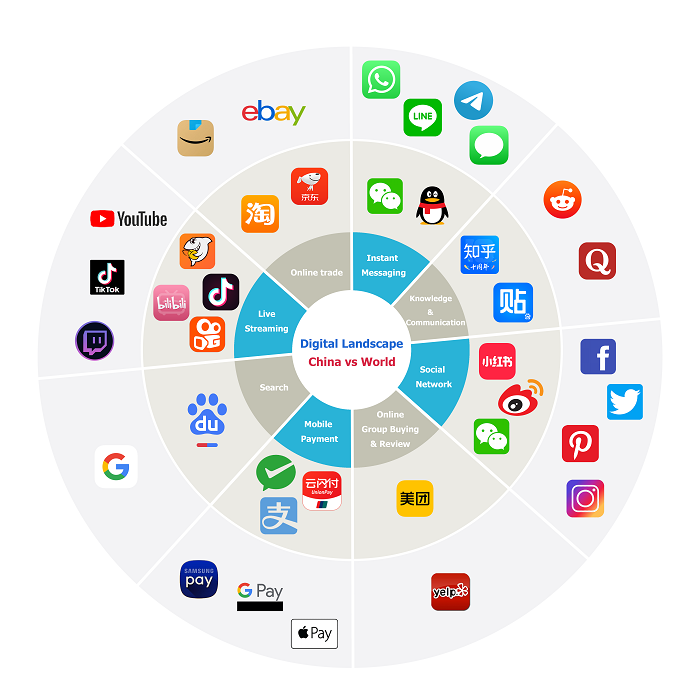Despite the ongoing pandemic and the looming threat of COVID-19’s latest variant, China’s economy still posted notable growth in 2021. According to data released by China’s National Bureau of Statistics, the country’s economy grew a record 18.3% in the first quarter of 2021 relative to the same quarter last year. The retail industry accounts for over 30% of this growth fueled by the eCommerce business that is currently booming and continues to flourish in China.
With a growing population of 1.4 billion people, eCommerce has become one of the most lucrative businesses in China which were enhanced further by the pandemic. Lockdowns forced people to stay in their homes, performing almost all errands online to meet their needs. This has made China’s digital ecosystem more attractive than ever. However, China’s digital economy is set up differently from the rest of the world. The following strategies will help give you an idea about how to prepare and how evaluate your business's readiness to expand within China.
Connection with the audience using China's unique social media environment
Social media is a potent marketing tool in China. However, unlike in the West, the popular social media apps in China are different. Facebook and Google are not allowed beyond the Great Firewall of China, and instead, apps such as WeChat, Weibo, and Kuaisho are dominant. Also, TikTok is known in China as Douyin. You will also see these social media apps behave differently from their Western counterparts. They often behave as if they are an eCommerce site despite their main features being messaging, online search, and video streaming. This unique format is common to super social apps which market their functions as a one-stop shop for everything a user needs.

These apps provide a new way of reaching target markets especially if you make use of KOLs (Key Opinion Leaders). These people are similar to online social media influencers in the West, and people in China tend to rely on them, especially for recommendations. KOLs who use these social media apps provide a personalized experience for their followers because they engage with them in an unscripted manner. Live streaming has also become an important tool for communicating with followers, providing a real-time experience to interact with KOLs.
Aside from being a more complex tool than the typical social media app that only has one main function, social media apps in China are also important for businesses as a market research tool. With a vast population and massive land area, penetrating target markets in China can be challenging. Most of China’s users also behave differently online depending on their tier-city – tier-cities are ranked according to their economic development. Social media in China allows people to express themselves from a granular perspective, which makes it easier for brands and businesses to learn about their target market’s habits and behaviors in a more organic fashion.
Understanding how China’s mobile payment system works
Similar to social media apps, China also has its own complex mobile payment system which is very important for eCommerce and online businesses to understand. China’s rural and urban customers were early adopters of digital payments that go beyond the use of physical debit or credit cards. Digital payments have become popular because it allows merchants to offer products cheaper than traditional brick-and-mortar stores. Credit card companies usually receive a 2% fee from credit card transactions, which gives digital payments more profit for business owners without passing on the fee to customers.
To date, WeChat and Alipay are two of the most sought-after digital payment systems in China. Users prefer these systems because they are easy to use, and they do not need to wait long to activate them relative to signing up for a traditional credit card. These apps are also accessible via the Cloud, so users, both merchants, and customers, can use these apps across different mobile devices, even on a desktop PC. These apps are also coupled with QR codes and NFC payments, making the process more secure since there is data encryption with each transaction. Using QR codes and NFC payments are also stand-alone features that do not rely on the Internet to be used. All these functions fuel China’s growing cashless economy.

Establish and maintain your online visibility within China
Gaining access to the China network can be a bit daunting for first-time users. That is why partnering with a local agent can be a smart move, allowing you to focus on business expansion as the agent takes care of the details for creating your website presence for China users.
Even though most users in China prefer to use apps, the best way for you to maintain online visibility is still to create a traditional website specifically catered to the requirements of the Chinese Ministry of Industry and Information Technology (MIIT)--the governing body that issues ICP licenses to business websites.
Some businesses keep their current websites “as is” and simply translate their content into Simplified Chinese, but doing so may not be enough if you will implement SEO for content since sentence structure and keywords may vary. Hosting your website outside China is an option, even though it can be more tedious to maintain because you need to consider loading speeds and consistency of delivering your site’s links 24/7.
Ecommerce professionals recommend constant site testing to ensure the accuracy and loading speeds of web pages and links delivered to your target users, across different devices and regions within China. You can also include an SEO plan to help ensure you are targeting the right users using keywords and key phrases when your target market searches for products and services. Creating a .cn website is not difficult, but it requires more personal information than other top-level domains. However, you may want to evaluate if it is beneficial given the costs for your business to register a .cn domain if China is not the biggest market you are targeting.
All these factors considered, creating a business in China is now more lucrative than ever. Aside from eCommerce, you can also tap into other ventures such as online learning. China’s digital ecosystem is rich, and as such, planning and strategy become critical for businesses prior to launching a website for their China users. For more details on how to build your business identity in China and what strategies you can employ to maintain and expand your identity, check out our solution.



